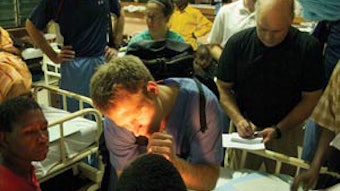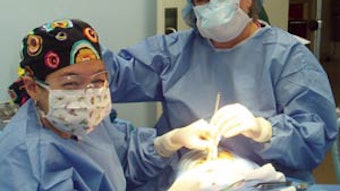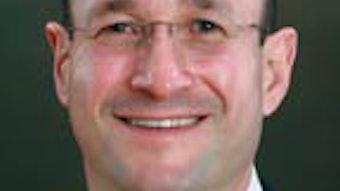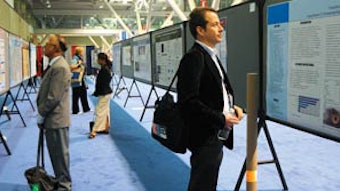Physician-Industry Relationships: The Heat Is On
Robert M. Portman, JD, and Johanna Michaels Kreisel, JD The AAO-HNS Ethics Committee strives to keep physicians apprised of ethical standards for physician-industry relationships. These standards have changed significantly in recent years. In the following article, healthcare attorneys Robert M. Portman, JD, MPP, and Johanna Michaels Kreisel, JD, review legal risks and cases to explore the current ethical landscape of physician/industry relationships. They also offer tips for physicians on how to safely navigate that landscape. It has never been more important for physicians to protect themselves; the best armor is knowledge. —Lauren S. Zaretsky, MD, Chair for the Ethics Committee Physician–industry relationships have come under intense legal and political scrutiny recently. Congress, the Food and Drug Administration (FDA), the HHS Office of Inspector General (OIG), federal and state prosecutors, and state legislatures, among others, have directed laser-like focus on the propriety of these relationships and are insisting on greater transparency and compliance with strict standards. Here are the most significant legal risks and political pressures that physicians confront in their relationships with the industry and tips to mitigate them. Legal Risks Associated with Industry Relationships Physician–industry relationships trigger scrutiny by the OIG and federal prosecutors under the federal False Claims Act, the Medicare-Medicaid Anti-Kickback statute, and FDA regulations on the promotion of unapproved uses of approved drugs and devices (i.e., “off-label uses”). The False Claims Act prohibits the knowing submission of false claims to government.1 The statute defines “knowing submission” broadly to include “actual knowledge,” “deliberate ignorance,” or “reckless disregard.” Physicians who act as consultants, clinical investigators, or speakers for pharmaceutical or device manufacturers may unwittingly be implicated in a false claims suit if they participate in the promotion or submission of a false claim for reimbursement relating to the use of pharmaceuticals or medical devices. The anti-kickback statute imposes both civil and criminal penalties for knowingly or willfully receiving or offering remuneration in any form to induce or generate business under any federal healthcare program.2 The OIG Compliance Program Guidance for Pharmaceutical Manufacturers, issued in 2003, makes clear that the exchange of remuneration between physicians and healthcare products companies is fraught with peril for both sides.3 In the OIG’s words, “These activities have a high potential for fraud and abuse and historically have generated a substantial number of anti-kickback convictions…if the remuneration is intended to generate any federal healthcare business, it potentially violates the anti-kickback statute.”4 Because of the inherent risks in these arrangements, the OIG recommends that all financial relationships between healthcare products companies and physicians fit within one of the anti-kickback safe harbors, such as the safe harbor for personal services and management contracts5 or employees.6 If the conditions for a safe harbor are not met, the OIG will look at the following factors in determining whether an arrangement violates the anti-kickback statute: nature of the relationship, manner in which payment is determined, value of remuneration, the impact on federal program costs/utilization, and potential conflicts of interest. The OIG Guidance notes that the Code on Interactions with Healthcare Professionals, originally issued by the Pharmaceutical Research and Manufacturers of America (PhRMA) in July 2002, addresses the OIG’s concerns and “provides useful and practical advice for reviewing and structuring these relationships.”7 The code adopts rigorous guidelines to prevent improper compensation relationships between physicians and pharmaceutical manufacturers. At the same time, the code permits drug companies to make reasonable payments for bona fide physician consulting and other services. The OIG states that while the agency won’t treat compliance with the PhRMA code like a safe harbor, “it will substantially reduce the risk of fraud and abuse and help demonstrate a good faith effort to comply with the applicable federal healthcare program requirements.”8 Given this unusual deference to a private ethical code, physicians would be well-advised to familiarize themselves with the provisions of the PhRMA code, as well as the OIG guidance document. PhRMA published a revised code in January 2009.9 The most important changes for physicians include the prohibition on the distribution of noneducational items to healthcare professionals and new disclosure requirements for physician speakers and consultants. Physicians should not accept any items or gifts from manufacturers that are not related to health education or treatment, even if such items are of minimum value, including pens, mugs, and other noneducational gifts. A physician may accept educational items of less than $100 as long as such items do not have value to the physician outside of his or her professional responsibilities. Another significant change is the prohibition on most meals and entertainment. Meals associated with a discussion or presentation of information that has educational value must occur in the office or hospital setting. The code also requires healthcare providers who participate in formulary boards, or serve as speakers or consultants, to disclose any relevant interests. The Advanced Medical Technology Association (AdvaMed), the association for medical device manufacturers, has issued a similar Code of Ethics on Interactions with Healthcare Professionals and recently followed PhRMA’s lead in revising its guidelines.10 The most important changes include a prohibition on entertainment and noneducational gifts for healthcare providers and a requirement that companies adopt and certify compliance with the Code. Following AdvaMed and PhRMA, the Council of Medical Specialty Societies (CMSS) has developed the “Code of Interaction with Companies,”11 which outlines the standards governing the relationships between medical specialty societies and for-profit healthcare companies. While less focused on individual physician interactions, this code has some key provisions with implications for physicians in elected roles. For example, the code requires physicians in leadership positions within their societies to divest themselves of all direct financial relationships with companies while in office, and board members are required to disclose all financial and uncompensated relationships with for-profit companies. Physicians should be particularly cautious about engaging in relationships with pharmaceutical and device manufacturers to promote “off-label” uses of their products—i.e., the use of an FDA-approved drug or device for unapproved indications not stated in approved labeling. In recent years, individual physicians have been found criminally liable for their involvement in the off-label uses. The FDA approves (or clears) drugs and devices for specific uses or purposes (referred to as “indications”). Manufacturers may not market their drugs or devices for unapproved uses. The FDA has developed rules on how information on off-label uses can be disseminated by industry and has issued guidance documents on this issue.12 Manufacturers may not promote off-label use but may provide information in response to unsolicited requests from physicians. The FDA recently published the Good Reprint Practices, which outlines allowable practices that do not constitute off-label promotion for the dissemination of literature related to off-label use.13 Under the FDA’s “practice of medicine” exception, the agency does not regulate a physician’s decision to use or prescribe an approved drug or device for another an unapproved use that the physician believes is appropriate in diagnosing or treating a patient. However, where physicians are acting on behalf of drug or device companies in communicating information about off-label uses of specific products, the agency will treat them as agents of the manufacturer subject to the same rules and penalties and not protected by the “practice of medicine” exception. Recent Enforcement Actions In recent years, the federal government has taken significant enforcement actions against improper promotion of off-label uses by companies such as Eli Lilly (Zyprexa),14 Pfizer (Bextra)15 and Cephalon (Gabitril and Provigil).16 The case of Peter Gleason, MD, highlights the potential risks for physicians who engage in promotional activities on behalf of manufacturers, or who promote off-label uses of drugs or devices in a manner that is inconsistent with FDA rules. Dr. Gleason was indicted in 2006 and charged with conspiracy to illegally market Xyrem, a prescription medication, for unapproved medical uses on behalf of the manufacturer Jazz Pharmaceuticals.17 Xyrem is also known as “GHB,” which has been used as a “date rape” drug. The FDA heavily restricts its distribution. Dr. Gleason received thousands of dollars (estimated at least $70,000 in 2004) from the manufacturer to speak to other physicians at seminars encouraging off-label use. He also advised physicians on how to secure reimbursement for off-label use of Xyrem. Initially, the government sought to persuade Dr. Gleason to testify against Jazz Pharmaceuticals. When he refused to do so, he was indicted. Later, the manufacturer decided to cooperate with the government in its case against Dr. Gleason and was never charged.18 Dr. Gleason pleaded guilty to one count of misdemeanor misbranding and was sentenced to one year probation.19 Physician–industry relationships have also been the subject of recent enforcement actions under the False Claims Act and the anti-kickback statute. Physicians can be implicated in these cases where they could be accused of “aiding” and “abetting” manufacturers in the promotion of drugs or devices in exchange for remuneration. For example, in a recent criminal action, Patrick Chan, MD, was sentenced to three years’ probation and a $25,000 criminal fine for soliciting and receiving kickbacks in exchange for promoting medical devices on behalf of Blackstone Medical of Springfield, a subsidiary of Orthofix International.20 Dr. Chan also paid $1.5 million in a corresponding civil false claims action. Other recent enforcement activities involve a combination of allegations under the False Claims Act, the anti-kickback statute, and FDA off-label use regulations. For instance, the Department of Justice intervened in a “whistleblower” suit where an individual (a former AstraZeneca employee) alleged that AstraZeneca violated the false claims and anti-kickback statutes by providing remuneration to physicians for speeches, research, and “ghost-writing” articles promoting the unapproved, off-label use of Seroquel and submitting these claims to the government.21 AstraZeneca paid a fine of $520 million and entered into a five-year corporate integrity agreement. The Department of Justice also recently announced a recovery of $600 million from Allergan Inc. to resolve charges that it violated the False Claims Act by illegally paying physicians to prescribe BOTOX Therapeutic for off-label use.22 Legislative Activity Congress and the states have also increased their scrutiny and regulation of physician-industry relationships. Consequently, as part of the recent health reform law, section 6002 of the Patient Protection and Affordable Care Act (PPACA), requires pharmaceutical, device, or medical supply manufacturers to submit transparency reports detailing gifts, compensation, entertainment, traveling fees, and ownership or investment interests provided to physicians or teaching hospitals for any item of value of more than $10 unless the aggregate value over the calendar year exceeds $100.23 Product samples are excluded from this requirement as long as they are intended for patient use. Manufacturers will be required to report the name of the recipient of the item, the amount of the transfer, and the description of the item. This information will be available online in a public searchable database that will include the recipient’s name, business address, and specialty. Manufacturers are also required to report physician ownership or investment interests held by a physician or family member. Manufacturers are required to begin collecting data on January 1, 2012, and the first annual report is due on March 31, 2013. The Secretary of Health and Human Services is obligated to issue guidance by October 1, 2011, to establish reporting procedures and plans for how the information will be made available to the public. Currently, seven states as well as the District of Columbia also regulate physician–industry interactions.24 Most notably, Massachusetts recently enacted comprehensive regulations requiring pharmaceutical and medical device manufacturers to disclose financial benefits and gifts to healthcare providers for any remuneration over $50.25 The law also prohibits companies from providing gifts and entertainment to physicians. Forewarned, Forearmed Because of the heightened scrutiny surrounding physician–industry relationships, physicians should be cautious when engaging in formal or informal relationships with pharmaceutical or medical device manufacturers. These relationships should adhere to the anti-kickback safe harbor provisions, the OIG guidance, and the PhRMA/AdvaMed codes of conduct. In forming a consulting or speaking engagement with a pharmaceutical or medical device manufacturer, physicians should avoid any involvement or actions in furthering off-label use of medical devices and pharmaceuticals that do not strictly comply with FDA rules. Failure to follow these guidelines creates tremendous risk for physicians, including possible civil and criminal liability, as well as personal and professional embarrassment. Robert M. Portman, JD, MPP, (1-202-872-6756; Rob.Portman@ppsv.com) and Johanna Michaels Kreisel are healthcare attorneys with the law firm of Powers, Pyles, Sutter & Verville, PC, in Washington, DC. Portman is also legal counsel for the American Academy of Otolaryngology—Head and Neck Surgery. An earlier version of this article appeared in Administrative Eyecare, a publication of the American Society of Cataract and Refractive Surgery and the American Society of Ophthalmic Administrators. References 31 U.S.C. 3729(a) 42 U.S.C. § 1320a-7b(b) Department of Health and Human Services, Office of Inspector General, “OIG Compliance Program Guidance for Pharmaceutical Manufacturers,” 68 Fed. Reg. 23731 (2003) (available at www.oig.hhs.gov). See also Department of Health and Human Services, Office of Inspector General, OIG Compliance Program Guidance for Individual and Small Group Physician Practices, 65 Fed. Reg. 59434 (2000) (available at www.oig.hhs.gov). 68 Fed. Reg. 23737. 42 C.F.R. § 1001.952(d). 42 C.F.R. § 1001.952(i). The original PhRMA code is available at http://www.phrma.org/files/PhRMA%20Code.pdf. 68 Fed. Reg. 23737. The revised code is available at http://www.phrma.org/code_on_interactions_with_healthcare_professionals/ http://www.advamed.org/NR/rdonlyres/61D30455-F7E9-4081-B219-12D6CE347585/0/AdvaMedCodeofEthicsRevisedandRestatedEffective20090701.pdf. Council of Medical Specialty Societies, Code for Interactions with Companies, http://www.cmss.org/uploadedFiles/Site/CMSS_Policies/CMSS%20Code%20for%20Interactions%20with%20Companies%204-19-10.pdf. See 21 C.F.R. § 99.1; 99.405; 62 Fed. Reg. 64074 (Dec. 3, 1997) (Guidance on Industry-Supported Scientific and Educational Activities) available at www.fda.gov/cder/guidance/isse.htm. http://www.fda.gov/oc/op/goodreprint.html (Such practices include material that is published in a peer-review publication, not influenced or written for a manufacturer and disclosed conflicts of interest) (last visited on April 6, 2009). http://www.usdoj.gov/opa/pr/2009/January/09-civ-038.html (assessed $515 million criminal fine, the largest ever in a criminal or civil suit against an individual or corporation). http://op.bna.com/hl.nsf/id/lroi-7vqmea/$File/Pfizer%20settlement.pdf (paid total of $2.3 billion in criminal and civil fines for illegal marketing) http://www.usdoj.gov/usao/pae/News/Pr/2008/sep/cephalonrelease.pdf (agreed to criminal plea and $444 million fine). Alex Berenson, “Indictment of Doctor Tests Drug Marketing Rules,” New York Times, July 22, 2006, available at http://www.nytimes.com/2006/07/22/business/22drugdoc.html?ex=1179288000&en=53396c715fc51c9a&ei=5070. Id. 240 N.Y.L.J 33 (September 26, 2008); http://psychcrimereporter.wordpress.com/2010/03/30/psychiatrist-peter-c-gleason-sentenced-for-federal-crime-reprimanded-in-california-on-patient-recordkeeping-violations/ (last visited Jan. 27, 2011). http://littlerock.fbi.gov/dojpressrel/pressrel08/kickbacks040808.htm; see Alice Dembner, Plea Bolsters Kickback Case against Mass. Medical Firm, Boston Globe, Jan. 4, 2008, http://www.boston.com/business/articles/2008/01/04/plea_bolsters_kickback_case_against_mass_medical_firm/ http://www.justice.gov/opa/pr/2010/April/10-civ-487.html. http://www.justice.gov/opa/pr/2010/September/10-civ-988.html Patient Protection and Affordable Care Act (“PPACA”), P.L. 111-148, 111th Congress § 6002, 42 U.S.C. 1320a-7h, http://www.gpo.gov/fdsys/pkg/PLAW-111publ148/pdf/PLAW-111publ148.pdf The seven states are California, Maine, Minnesota, Nevada, Vermont, West Virginia and Massachusetts. Massachusetts Department of Health http://www.mass.gov/?pageID=eohhs2pressrelease&L=4&L0=Home&L1=Government&L2=Departments+and+Divisions&L3=Department+of+Public+Health&sid=Eeohhs2&b=pressrelease&f=090311_tough_new_rules&csid=Eeohhs2.
 Robert M. Portman, JD
Robert M. Portman, JDRobert M. Portman, JD,
and Johanna Michaels Kreisel, JD
The AAO-HNS Ethics Committee strives to keep physicians apprised of ethical standards for physician-industry relationships. These standards have changed significantly in recent years. In the following article, healthcare attorneys Robert M. Portman, JD, MPP, and Johanna Michaels Kreisel, JD, review legal risks and cases to explore the current ethical landscape of physician/industry relationships. They also offer tips for physicians on how to safely navigate that landscape. It has never been more important for physicians to protect themselves; the best armor is knowledge.
—Lauren S. Zaretsky, MD,
Chair for the Ethics Committee
Physician–industry relationships have come under intense legal and political scrutiny recently. Congress, the Food and Drug Administration (FDA), the HHS Office of Inspector General (OIG), federal and state prosecutors, and state legislatures, among others, have directed laser-like focus on the propriety of these relationships and are insisting on greater transparency and compliance with strict standards. Here are the most significant legal risks and political pressures that physicians confront in their relationships with the industry and tips to mitigate them.
 Johanna Michaels Kreisel, JD
Johanna Michaels Kreisel, JDLegal Risks Associated with Industry Relationships
Physician–industry relationships trigger scrutiny by the OIG and federal prosecutors under the federal False Claims Act, the Medicare-Medicaid Anti-Kickback statute, and FDA regulations on the promotion of unapproved uses of approved drugs and devices (i.e., “off-label uses”).
The False Claims Act prohibits the knowing submission of false claims to government.1 The statute defines “knowing submission” broadly to include “actual knowledge,” “deliberate ignorance,” or “reckless disregard.” Physicians who act as consultants, clinical investigators, or speakers for pharmaceutical or device manufacturers may unwittingly be implicated in a false claims suit if they participate in the promotion or submission of a false claim for reimbursement relating to the use of pharmaceuticals or medical devices.
The anti-kickback statute imposes both civil and criminal penalties for knowingly or willfully receiving or offering remuneration in any form to induce or generate business under any federal healthcare program.2
The OIG Compliance Program Guidance for Pharmaceutical Manufacturers, issued in 2003, makes clear that the exchange of remuneration between physicians and healthcare products companies is fraught with peril for both sides.3 In the OIG’s words, “These activities have a high potential for fraud and abuse and historically have generated a substantial number of anti-kickback convictions…if the remuneration is intended to generate any federal healthcare business, it potentially violates the anti-kickback statute.”4
Because of the inherent risks in these arrangements, the OIG recommends that all financial relationships between healthcare products companies and physicians fit within one of the anti-kickback safe harbors, such as the safe harbor for personal services and management contracts5 or employees.6 If the conditions for a safe harbor are not met, the OIG will look at the following factors in determining whether an arrangement violates the anti-kickback statute: nature of the relationship, manner in which payment is determined, value of remuneration, the impact on federal program costs/utilization, and potential conflicts of interest.
The OIG Guidance notes that the Code on Interactions with Healthcare Professionals, originally issued by the Pharmaceutical Research and Manufacturers of America (PhRMA) in July 2002, addresses the OIG’s concerns and “provides useful and practical advice for reviewing and structuring these relationships.”7 The code adopts rigorous guidelines to prevent improper compensation relationships between physicians and pharmaceutical manufacturers.
At the same time, the code permits drug companies to make reasonable payments for bona fide physician consulting and other services. The OIG states that while the agency won’t treat compliance with the PhRMA code like a safe harbor, “it will substantially reduce the risk of fraud and abuse and help demonstrate a good faith effort to comply with the applicable federal healthcare program requirements.”8 Given this unusual deference to a private ethical code, physicians would be well-advised to familiarize themselves with the provisions of the PhRMA code, as well as the OIG guidance document.
PhRMA published a revised code in January 2009.9 The most important changes for physicians include the prohibition on the distribution of noneducational items to healthcare professionals and new disclosure requirements for physician speakers and consultants. Physicians should not accept any items or gifts from manufacturers that are not related to health education or treatment, even if such items are of minimum value, including pens, mugs, and other noneducational gifts. A physician may accept educational items of less than $100 as long as such items do not have value to the physician outside of his or her professional responsibilities.
Another significant change is the prohibition on most meals and entertainment. Meals associated with a discussion or presentation of information that has educational value must occur in the office or hospital setting. The code also requires healthcare providers who participate in formulary boards, or serve as speakers or consultants, to disclose any relevant interests.
The Advanced Medical Technology Association (AdvaMed), the association for medical device manufacturers, has issued a similar Code of Ethics on Interactions with Healthcare Professionals and recently followed PhRMA’s lead in revising its guidelines.10 The most important changes include a prohibition on entertainment and noneducational gifts for healthcare providers and a requirement that companies adopt and certify compliance with the Code.
Following AdvaMed and PhRMA, the Council of Medical Specialty Societies (CMSS) has developed the “Code of Interaction with Companies,”11 which outlines the standards governing the relationships between medical specialty societies and for-profit healthcare companies. While less focused on individual physician interactions, this code has some key provisions with implications for physicians in elected roles. For example, the code requires physicians in leadership positions within their societies to divest themselves of all direct financial relationships with companies while in office, and board members are required to disclose all financial and uncompensated relationships with for-profit companies.
Physicians should be particularly cautious about engaging in relationships with pharmaceutical and device manufacturers to promote “off-label” uses of their products—i.e., the use of an FDA-approved drug or device for unapproved indications not stated in approved labeling. In recent years, individual physicians have been found criminally liable for their involvement in the off-label uses.
The FDA approves (or clears) drugs and devices for specific uses or purposes (referred to as “indications”). Manufacturers may not market their drugs or devices for unapproved uses. The FDA has developed rules on how information on off-label uses can be disseminated by industry and has issued guidance documents on this issue.12 Manufacturers may not promote off-label use but may provide information in response to unsolicited requests from physicians. The FDA recently published the Good Reprint Practices, which outlines allowable practices that do not constitute off-label promotion for the dissemination of literature related to off-label use.13
Under the FDA’s “practice of medicine” exception, the agency does not regulate a physician’s decision to use or prescribe an approved drug or device for another an unapproved use that the physician believes is appropriate in diagnosing or treating a patient. However, where physicians are acting on behalf of drug or device companies in communicating information about off-label uses of specific products, the agency will treat them as agents of the manufacturer subject to the same rules and penalties and not protected by the “practice of medicine” exception.
Recent Enforcement Actions
In recent years, the federal government has taken significant enforcement actions against improper promotion of off-label uses by companies such as Eli Lilly (Zyprexa),14 Pfizer (Bextra)15 and Cephalon (Gabitril and Provigil).16 The case of Peter Gleason, MD, highlights the potential risks for physicians who engage in promotional activities on behalf of manufacturers, or who promote off-label uses of drugs or devices in a manner that is inconsistent with FDA rules.
Dr. Gleason was indicted in 2006 and charged with conspiracy to illegally market Xyrem, a prescription medication, for unapproved medical uses on behalf of the manufacturer Jazz Pharmaceuticals.17 Xyrem is also known as “GHB,” which has been used as a “date rape” drug. The FDA heavily restricts its distribution. Dr. Gleason received thousands of dollars (estimated at least $70,000 in 2004) from the manufacturer to speak to other physicians at seminars encouraging off-label use. He also advised physicians on how to secure reimbursement for off-label use of Xyrem. Initially, the government sought to persuade Dr. Gleason to testify against Jazz Pharmaceuticals. When he refused to do so, he was indicted. Later, the manufacturer decided to cooperate with the government in its case against Dr. Gleason and was never charged.18 Dr. Gleason pleaded guilty to one count of misdemeanor misbranding and was sentenced to one year probation.19
Physician–industry relationships have also been the subject of recent enforcement actions under the False Claims Act and the anti-kickback statute. Physicians can be implicated in these cases where they could be accused of “aiding” and “abetting” manufacturers in the promotion of drugs or devices in exchange for remuneration. For example, in a recent criminal action, Patrick Chan, MD, was sentenced to three years’ probation and a $25,000 criminal fine for soliciting and receiving kickbacks in exchange for promoting medical devices on behalf of Blackstone Medical of Springfield, a subsidiary of Orthofix International.20 Dr. Chan also paid $1.5 million in a corresponding civil false claims action.
Other recent enforcement activities involve a combination of allegations under the False Claims Act, the anti-kickback statute, and FDA off-label use regulations. For instance, the Department of Justice intervened in a “whistleblower” suit where an individual (a former AstraZeneca employee) alleged that AstraZeneca violated the false claims and anti-kickback statutes by providing remuneration to physicians for speeches, research, and “ghost-writing” articles promoting the unapproved, off-label use of Seroquel and submitting these claims to the government.21 AstraZeneca paid a fine of $520 million and entered into a five-year corporate integrity agreement. The Department of Justice also recently announced a recovery of $600 million from Allergan Inc. to resolve charges that it violated the False Claims Act by illegally paying physicians to prescribe BOTOX Therapeutic for off-label use.22
Legislative Activity
Congress and the states have also increased their scrutiny and regulation of physician-industry relationships. Consequently, as part of the recent health reform law, section 6002 of the Patient Protection and Affordable Care Act (PPACA), requires pharmaceutical, device, or medical supply manufacturers to submit transparency reports detailing gifts, compensation, entertainment, traveling fees, and ownership or investment interests provided to physicians or teaching hospitals for any item of value of more than $10 unless the aggregate value over the calendar year exceeds $100.23 Product samples are excluded from this requirement as long as they are intended for patient use. Manufacturers will be required to report the name of the recipient of the item, the amount of the transfer, and the description of the item. This information will be available online in a public searchable database that will include the recipient’s name, business address, and specialty. Manufacturers are also required to report physician ownership or investment interests held by a physician or family member. Manufacturers are required to begin collecting data on January 1, 2012, and the first annual report is due on March 31, 2013. The Secretary of Health and Human Services is obligated to issue guidance by October 1, 2011, to establish reporting procedures and plans for how the information will be made available to the public.
Currently, seven states as well as the District of Columbia also regulate physician–industry interactions.24 Most notably, Massachusetts recently enacted comprehensive regulations requiring pharmaceutical and medical device manufacturers to disclose financial benefits and gifts to healthcare providers for any remuneration over $50.25 The law also prohibits companies from providing gifts and entertainment to physicians.
Forewarned, Forearmed
Because of the heightened scrutiny surrounding physician–industry relationships, physicians should be cautious when engaging in formal or informal relationships with pharmaceutical or medical device manufacturers. These relationships should adhere to the anti-kickback safe harbor provisions, the OIG guidance, and the PhRMA/AdvaMed codes of conduct. In forming a consulting or speaking engagement with a pharmaceutical or medical device manufacturer, physicians should avoid any involvement or actions in furthering off-label use of medical devices and pharmaceuticals that do not strictly comply with FDA rules. Failure to follow these guidelines creates tremendous risk for physicians, including possible civil and criminal liability, as well as personal and professional embarrassment.
Robert M. Portman, JD, MPP, (1-202-872-6756; Rob.Portman@ppsv.com) and Johanna Michaels Kreisel are healthcare attorneys with the law firm of Powers, Pyles, Sutter & Verville, PC, in Washington, DC. Portman is also legal counsel for the American Academy of Otolaryngology—Head and Neck Surgery. An earlier version of this article appeared in Administrative Eyecare, a publication of the American Society of Cataract and Refractive Surgery and the American Society of Ophthalmic Administrators.
References
- 31 U.S.C. 3729(a)
- 42 U.S.C. § 1320a-7b(b)
- Department of Health and Human Services, Office of Inspector General, “OIG Compliance Program Guidance for Pharmaceutical Manufacturers,” 68 Fed. Reg. 23731 (2003) (available at www.oig.hhs.gov). See also Department of Health and Human Services, Office of Inspector General, OIG Compliance Program Guidance for Individual and Small Group Physician Practices, 65 Fed. Reg. 59434 (2000) (available at www.oig.hhs.gov).
- 68 Fed. Reg. 23737.
- 42 C.F.R. § 1001.952(d).
- 42 C.F.R. § 1001.952(i).
- The original PhRMA code is available at http://www.phrma.org/files/PhRMA%20Code.pdf.
- 68 Fed. Reg. 23737.
- The revised code is available at http://www.phrma.org/code_on_interactions_with_healthcare_professionals/
- http://www.advamed.org/NR/rdonlyres/61D30455-F7E9-4081-B219-12D6CE347585/0/AdvaMedCodeofEthicsRevisedandRestatedEffective20090701.pdf.
- Council of Medical Specialty Societies, Code for Interactions with Companies, http://www.cmss.org/uploadedFiles/Site/CMSS_Policies/CMSS%20Code%20for%20Interactions%20with%20Companies%204-19-10.pdf.
- See 21 C.F.R. § 99.1; 99.405; 62 Fed. Reg. 64074 (Dec. 3, 1997) (Guidance on Industry-Supported Scientific and Educational Activities) available at www.fda.gov/cder/guidance/isse.htm.
- http://www.fda.gov/oc/op/goodreprint.html (Such practices include material that is published in a peer-review publication, not influenced or written for a manufacturer and disclosed conflicts of interest) (last visited on April 6, 2009).
- http://www.usdoj.gov/opa/pr/2009/January/09-civ-038.html (assessed $515 million criminal fine, the largest ever in a criminal or civil suit against an individual or corporation).
- http://op.bna.com/hl.nsf/id/lroi-7vqmea/$File/Pfizer%20settlement.pdf (paid total of $2.3 billion in criminal and civil fines for illegal marketing)
- http://www.usdoj.gov/usao/pae/News/Pr/2008/sep/cephalonrelease.pdf (agreed to criminal plea and $444 million fine).
- Alex Berenson, “Indictment of Doctor Tests Drug Marketing Rules,” New York Times, July 22, 2006, available at http://www.nytimes.com/2006/07/22/business/22drugdoc.html?ex=1179288000&en=53396c715fc51c9a&ei=5070.
- Id.
- 240 N.Y.L.J 33 (September 26, 2008); http://psychcrimereporter.wordpress.com/2010/03/30/psychiatrist-peter-c-gleason-sentenced-for-federal-crime-reprimanded-in-california-on-patient-recordkeeping-violations/ (last visited Jan. 27, 2011).
- http://littlerock.fbi.gov/dojpressrel/pressrel08/kickbacks040808.htm; see Alice Dembner, Plea Bolsters Kickback Case against Mass. Medical Firm, Boston Globe, Jan. 4, 2008, http://www.boston.com/business/articles/2008/01/04/plea_bolsters_kickback_case_against_mass_medical_firm/
- http://www.justice.gov/opa/pr/2010/April/10-civ-487.html.
- http://www.justice.gov/opa/pr/2010/September/10-civ-988.html
- Patient Protection and Affordable Care Act (“PPACA”), P.L. 111-148, 111th Congress § 6002, 42 U.S.C. 1320a-7h, http://www.gpo.gov/fdsys/pkg/PLAW-111publ148/pdf/PLAW-111publ148.pdf
- The seven states are California, Maine, Minnesota, Nevada, Vermont, West Virginia and Massachusetts.
- Massachusetts Department of Health http://www.mass.gov/?pageID=eohhs2pressrelease&L=4&L0=Home&L1=Government&L2=Departments+and+Divisions&L3=Department+of+Public+Health&sid=Eeohhs2&b=pressrelease&f=090311_tough_new_rules&csid=Eeohhs2.













